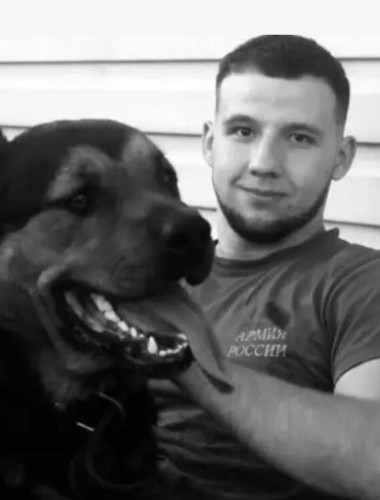Ilya Baburin is a Political Prisoner
An IT specialist has been sentenced to 25 years in a strict regime penal colony for attempting to organise an arson attack on a military recruitment office and for alleged participation in the Azov Battalion
The ‘Political Prisoners. Memorial’ human rights project, in accordance with international standards, considers Ilya Baburin a political prisoner. Baburin was convicted on six criminal charges, including treason, committing and attempting to organise an act of terrorism, participating in an illegal armed group, and involvement in a terrorist organisation. Baburin’s criminal prosecution and conviction violated his right to a fair trial and showed signs of provocation by the security services and the fabrication of evidence. We demand the immediate release of Ilya Baburin and that all criminal charges against him be dropped. We also demand that his allegations of torture be investigated and those responsible held accountable.

What were the charges against Ilya Baburin?
In 2021 Ilya Baburin, from Novosibirsk, spent several months in Ukraine before returning to Russia. According to the investigative authorities, while in Ukraine, Baburin met fighters from the Ukrainian Azov Battalion who, after the full-scale invasion in 2022, allegedly offered him money to carry out arson attacks in Novosibirsk.
On 22 September 2022, Baburin was detained. Initially, he was charged with preparing to set fire to a military recruitment office and accused of attempting to organise an act of terrorism (Article 30, Part 3, in conjunction with Article 205.1, Part 4, of the Russian Criminal Code). On 20 March 2023, on the basis of alleged contacts with the Azov Battalion, Baburin was additionally charged with treason for allegedly assisting a foreign organisation in activities directed against Russia’s security (Article 275).
On 28 September 2023, Baburin faced further charges related to the setting on fire of a music school’s window, classified as a terrorist act (Article 205, Part 1). He was also charged with illegal acquisition of a listening device (Article 138.1) after a GPS tracker with a hidden microphone was found during a search of his home.
Finally, on 18 December 2023 — again for alleged links to the Azov Battalion — Baburin was charged with participating in an illegal armed group (Article 208, Part 2) and participating in a terrorist organisation (Article 205.5, Part 2).
Initially, Ilya Baburin confessed to the charges but later withdrew his confession and claimed that he had been pressured by investigators. According to Baburin, although he had at first considered setting fire to a military recruitment office, he changed his mind and became the target of an FSB provocation. He denied any connection to the Azov Battalion or to the music school arson. After retracting his confession, Baburin faced further pressure in detention. He was repeatedly placed in solitary confinement and subjected to harsh conditions; in September 2023, he was beaten by prison convoy guards.
On 20 May 2024, a court in Novosibirsk sentenced Ilya Baburin to 25 years’ imprisonment, with the first five years to be served in a cell-type prison and the remainder in a strict regime penal colony. He was also sentenced to 18 months’ probation after release and fined 100,000 roubles. On 15 October 2024, the sentence was upheld on appeal.
Why do we consider Baburin a political prisoner?
The charge against Baburin of attempting to organise an act of terrorism was based on an FSB provocation and the testimony of a secret witness. Even after Baburin abandoned the idea of setting fire to the military recruitment office, the FSB provocateur continued pushing him to go through with it. Moreover, the audio recording of the meeting at which Baburin supposedly proposed committing the arson to an acquaintance was ‘accidentally’ destroyed.
The only evidence regarding the alleged terrorist act is a video of a music school window being set on fire that law enforcement officers found on Baburin’s phone. However, there are no grounds to consider this fire an act of terrorism.
The accusations of involvement in the Azov Battalion, which led to three additional criminal charges, were excessive and unfounded. Baburin’s actions did not qualify as treason because he did not assist Azov in activities directed against Russia’s security. Moreover, Azov is an official unit of the Ukrainian National Guard and therefore cannot be considered an illegal armed group or terrorist organisation.
Finally, regarding the charge of illegally acquiring a listening device, it should be noted that GPS trackers with hidden microphones are commercially available. The investigative authorities failed to prove that Baburin was aware of the hidden microphone.
A detailed description of Ilya Baburin’s case and of our position is available on our website.
Recognition of an individual as a political prisoner does not imply that the ‘Political Prisoners. Memorial’ human rights project agrees with, or approves of, their views, statements, or actions.
How can you help?
You can write to Ilya Baburin at the following address:
In Russian: 630010, г. Новосибирск, ул. Караваева, д. 1, ФКУ СИЗО-1 ГУФСИН России по Новосибирской области, Бабурину Илье Николаевичу, 1999 г. р.
In English: Ilya Nikolaevich Baburin (born 1999), Remand Prison No. 1, Federal Penitentiary Service for Novosibirsk Oblast, 1 Karavaeva Street, Novosibirsk, 630010, Russia.
You can also send emails via ZT (for payment with Russian bank cards), OVD-Info and Memorial-France (free of charge).
Please note that letters in languages other than Russian are highly unlikely to reach the intended recipient.
Ilya Baburin is supported by the human rights initiative Solidarity zone.
You can donate to help all political prisoners in Russia.
